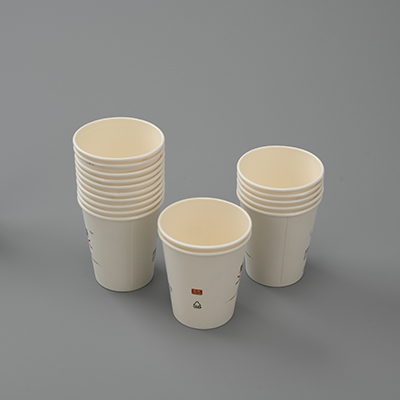Uncoated paper cups (plastic-free coating type) offer comprehensive advantages over traditional PE-coated paper cups, covering four core dimensions: environmental sustainability, safety, practicality, and policy compliance. Below is a detailed English translation tailored for foreign trade websites, with professional terminology and market-oriented expression:

Low-carbon and renewable raw materials: The bio-based coating is derived from renewable resources such as corn starch and bagasse, eliminating reliance on petroleum (the core raw material for traditional PE coatings). Producing 1 ton of uncoated paper cups generates 30%-50% less carbon emissions than traditional ones, aligning with the "dual carbon" goals.
Degradable/Recyclable: Bio-based coated cups can be fully biodegraded within 3-6 months in compost or natural environments, breaking down into carbon dioxide and water without plastic residues. Mineral-coated cups do not release harmful substances and can be recycled synchronously with paper substrates, solving the pain point of traditional paper cups—low recycling rate (less than 5%) due to difficult separation of paper and plastic layers.
Reduced environmental burden: Discarded traditional PE-coated cups leave plastic residues in soil for hundreds of years, which may decompose into microplastics polluting water bodies. Uncoated paper cups avoid such pollution and do not emit toxic gases (e.g., dioxins) when incinerated.
Zero microplastic intake: Traditional PE-coated cups tend to soften and shed coatings when holding hot drinks above 90℃, producing microplastics that may enter the human body with long-term consumption. The eco-friendly coatings (bio-based, mineral, etc.) of uncoated cups have higher heat resistance (some up to 120℃), remaining intact and non-degradable at high temperatures without any microplastic generation.
No harmful substance release: Traditional PE coatings may contain additives like plasticizers and bisphenol A, which are prone to leaching when exposed to high temperatures or acidic drinks (e.g., lemon tea, fruit juice). The coatings of uncoated cups pass food-grade safety tests, free from plasticizers, solvents, heavy metals, and other harmful substances, even when in contact with acidic or oily beverages.
Preserve original flavor: Traditional PE coatings often have a slight plastic odor that may affect the taste of sensitive drinks like coffee and pure tea. Uncoated cups’ eco-friendly coatings are odorless, maximizing the retention of the drink’s natural aroma and taste.
Superior heat insulation: The base paper of uncoated cups is thicker (180-250g/㎡ vs. 150-200g/㎡ for traditional ones). Combined with the auxiliary heat insulation of the coating, it prevents scalding when holding cups with 95℃ hot water, eliminating the need for additional cup sleeves.
Wide application scope: Traditional PE-coated cups are partially intolerant to acids and oils, risking leakage when holding carbonated drinks or milk tea. Uncoated cups with mineral or water-based barrier coatings have more stable acid, alkali, and oil resistance—suitable for both hot drinks (coffee, soup, boiling water) and cold drinks (cola, fruit juice, iced milk tea), and can even hold small amounts of oily beverages (e.g., soybean milk, hot milk) for a short time.
Flexible functionality: Some uncoated cups are labeled "microwave-safe," allowing heating for up to 1 minute, ideal for offices and households needing quick warm-ups. Traditional PE-coated cups melt and deform under microwave heating, making them unusable for this purpose.
Higher durability: The coating of uncoated cups adheres more firmly to the paper substrate, resisting damage from rubbing or collision. It has a lower leakage risk than traditional cups and better load-bearing capacity, avoiding deformation when fully filled with drinks.
Brand image enhancement: For businesses (cafés, milk tea shops, fast-food restaurants), using uncoated cups conveys eco-friendly and healthy brand values, catering to modern consumers’ demand for green consumption and gaining greater recognition among young demographics.
Strong policy compliance: With "plastic restriction orders" and "plastic ban orders" implemented in many regions to limit non-degradable plastic products, uncoated cups serve as a compliant alternative to traditional plastic-coated cups. They avoid policy risks and ensure long-term operational stability.